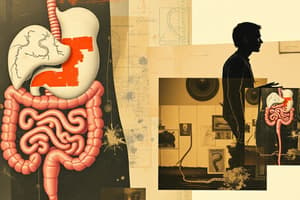Podcast
Questions and Answers
What is the primary role of Gastrin in the stomach?
What is the primary role of Gastrin in the stomach?
- Increases pancreatic enzyme activity
- Stimulates secretion of gastric juices (correct)
- Stimulates the release of bile
- Regulates blood glucose levels
What hormone is released by the duodenum in response to chyme volume?
What hormone is released by the duodenum in response to chyme volume?
- Gastrin
- CCK (correct)
- Secretin
- Insulin
Which of the following is not stimulated by Secretin?
Which of the following is not stimulated by Secretin?
- Gallbladder contraction (correct)
- Bicarbonate production
- Pancreatic enzyme formation
- Pancreatic secretion
In adults, what is the typical homeostatic level of blood glucose?
In adults, what is the typical homeostatic level of blood glucose?
What effect does hyperglycemia have on the body?
What effect does hyperglycemia have on the body?
Flashcards
Gastrin's function
Gastrin's function
Gastrin stimulates the secretion of gastric juices (HCl, mucus, water, and pepsin activation) in the stomach, preparing it for food digestion.
CCK's role in digestion
CCK's role in digestion
CCK, released by the duodenum in response to chyme, triggers bile release from the gallbladder for lipid emulsification.
Secretin's function
Secretin's function
Secretin, released by the duodenum in response to chyme, stimulates pancreatic secretions to help neutralize the chyme.
Normal blood glucose level
Normal blood glucose level
Signup and view all the flashcards
Blood glucose response after a meal
Blood glucose response after a meal
Signup and view all the flashcards
Study Notes
Stomach Control
- Neural stimulation triggers stomach endocrine cells to release gastrin.
- Gastrin stimulates the secretion of gastric juices (HCl, mucus, water, pepsin).
- Positive feedback loops prepare the stomach for food intake.
Chyme Entry and Hormonal Responses (Duodenum)
- Chyme entering the duodenum triggers the release of CCK from duodenal endocrine cells.
- CCK stimulates the gallbladder to release bile for lipid emulsification.
- CCK levels are directly proportional to chyme levels in the duodenum.
- Secretin is released from duodenal endocrine cells in response to chyme entry.
- Secretin stimulates pancreatic secretion, including enzyme formation and bicarbonate production.
- Secretin levels are proportional to chyme levels in the duodenum.
- Bile production and secretion by the liver are not hormonally controlled.
Blood Glucose Homeostasis
- Normal blood glucose levels in adults are approximately 3-4.5 mmol/dL.
- Elevated levels (hyperglycemia) and decreased levels (hypoglycemia) are abnormal.
- Hyperglycemia can cause tissue damage, glaucoma, swelling, or neurological issues.
- Hypoglycemia can lead to problems with temperature regulation, hypotension, and bradycardia.
Post-Meal Blood Glucose
- Blood glucose rises a few hours after a meal.
- A blood glucose level of 5.0 mmol/dL is a trigger point.
Between-Meal Blood Glucose
- Between meals, blood glucose levels drop, triggering the 3.5 mmol/dL level threshold.
Studying That Suits You
Use AI to generate personalized quizzes and flashcards to suit your learning preferences.




